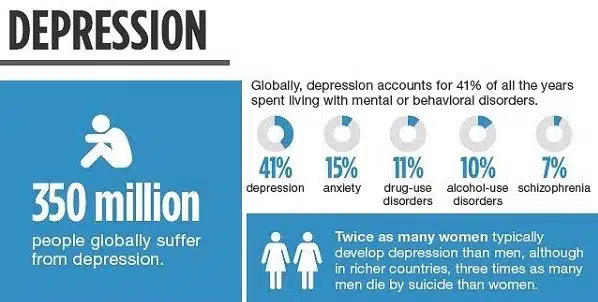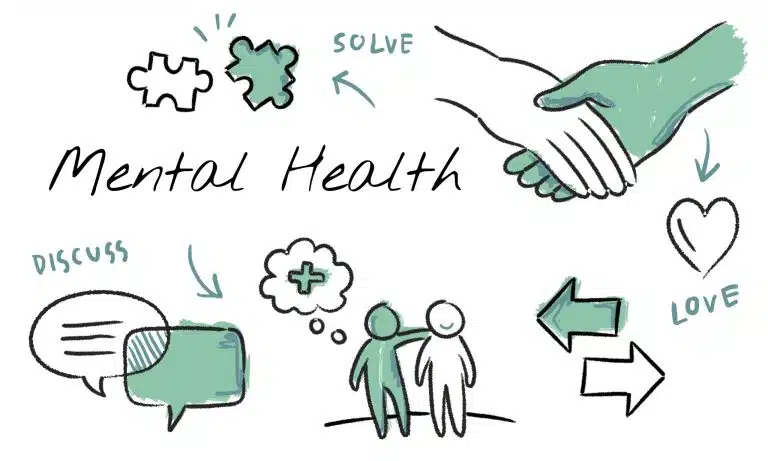How does loneliness affect our mental and physical health?
Peplau and Perlam in 1982 described loneliness as the disparity between one’s intended interpersonal relationship compared to the actual relationships they already have. Humans are inherently social beings that thrive in small units hence loneliness is an unpleasant emotional response to the feeling of being isolated or alone.
Most times loneliness creates a feeling of emptiness, unwantedness, unworthiness, and the feeling of not being loved. It is described as the equivalent of physical pain, hunger or thirst which yearns for social connection to maintain the formation of social connections needed for the survival of our genes (John et al., 2006). This explains why when one feels lonely, there is usually the urge to reach out to or reconnect with someone.
In 2018, Cigna conducted a national survey and proposed that the level of loneliness had reached an all-time high. The research indicated that almost half of 20,000 U.S adults sometimes or always feel alone. Forty percent of participants also mentioned that the relationships they have with people are not meaningful and often feel isolated.
If loneliness is not attended to, it could affect our physical health; for example, hypertension, coronary heart disease (mainly amongst women) and our mental health, leading to certain mental health conditions such as depression, sleep problems, anxiety, and low self-esteem, low self-confidence.

What can cause loneliness?
Low self-esteem is often characterised by a lack of self-confidence and feeling bad about oneself and often exhibiting the feeling of being unlovable, incomplete, or awkward. These ill feelings that one thinks about themselves often make them hesitant to engage with other people, and even if they do, they do not feel worthy enough of other people’s time and attention this brings about having fewer intimate relationships with people thereby increasing loneliness.
Lack of self-assertiveness; being self-assertive is to be able to stand up for one’s rights and that of others politely without passively accepting wrong. When an individual lacks assertiveness and decides to be passive-aggressive instead of assertive, then it is difficult to build or maintain intimate relationships which invariably increases the feeling of loneliness.
Social anxiety is also known as social phobia. It is the feeling of being nervous in engaging in social activities such as participating in field trips, cooking groups, sports, date night, attending a party, etc. Feeling nervous about certain activities such as giving a presentation is normal, but when one begins to feel anxious, self-conscious, embarrassed, or overly worried toward everyday interactions, it depicts social anxiety. Being anxious around people all the time makes it more difficult to make new relationships or maintain existing relationships, this could increase loneliness.
Trauma is an emotional response sustained like anxiety or fear due to a distressing event such as bereavement. Losing a loved one can suddenly induce the feeling of being lonely. Due to fear of losing a loved one, people also find themselves detaching from loved ones because of the hurt of experiencing loss. Again, if a child was abused by a specific gender, there is every tendency for that child to withdraw from similar genders this will reduce social connections and in turn increase loneliness.
Values confusion: personal values go a long way to defining who we are. They are the characters and behaviours that motivate and guide our decisions and actions. Being around people with whom we share the same values is a way to engage with people, which helps to reduce loneliness. If one’s values are confusing, it is easy to identify with people who have conflicting values thereby feeling disconnected and very lonely.
Poor self-awareness: self-awareness is the ability to be conscious of one’s individuality, thoughts, actions, and emotions. With poor self-awareness, one begins to experience more negative emotions due to the inability to properly align one’s reactions or thoughts to a situation. Feeling disconnected from oneself due to poor self-awareness could increase the feeling of loneliness.
What are the types of loneliness?
Emotional loneliness is also known as intimate loneliness. It is the feeling of not having a spouse or significant attachments that one can rely on for emotional support in times of need and reciprocated favours. The absence of good emotional attachments might make you feel lonelier when everyone around you has a romantic partner or when someone you are very close to moves out of your life. Statistics have shown that the negative predictor of emotional loneliness was marital status implying that an intimate partner can be a source of emotional attachment and connection for adults which significantly reduces emotional loneliness (Hawkley et al., 2005).
Social loneliness can be termed relational loneliness. It is the deficiency of close and healthy relationships with family members and friends. Relationships with these groups of people could be referred to as “sympathy groups.” It is a source of support for child carers, soft loans, projects, etc. When you feel like you don’t have a sense of belonging to a social network or support apart from yourself or your intimate partner, you may feel socially lonely. Everyone needs good social support as this helps to improve our overall well-being. A major negative predictor of social loneliness in middle-aged adults is how often they communicate with their sympathy group. Whilst the quality of the relationship we have with people is more important, it is advisable to increase social engagement to build more healthy relationships.
Collective loneliness is the perceived absence of shared social identities which is beyond the individual level for example group, team, or national identity (Cacioppo et al., 2014). The collective loneliness factor depicts that we might have evolved the ability and motivation to form not only with individuals but with larger groups with the mindset of promoting cooperation of aversion conditions, for example, hunting, and warfare. This collective space may involve between 150 to 1500 people who can be described as having weak ties and low-cost support. A negative predictor of collective loneliness found in middle-aged and older adults was the number of voluntary groups that an individual belongs to. The more voluntary groups an individual belongs to the less collective loneliness they feel. This dimension of loneliness is mostly found in women compared to men and with the collective loneliness comes identification and investments in group activities, which in turn may increase the sustenance and continuity of these group relationships, its members, and their genetic legacy.
Loneliness and its effects on mental health
Loneliness is deeply connected to depression as research has shown that lonely people are more likely to develop depressive symptoms because they tend to be less happy, less satisfied, and more pessimistic. Other symptoms could be the feeling of being helpless and in pain. Although loneliness may be characterized as a subset of depression the difference is managed with the hope that all will be well when exposed to social factors. Being lonely could trigger social anxiety which is the fear of being exposed to social situations.

Dementia has a link with loneliness as with loneliness comes reduced recognition, reduced constant speed, and semantic memory. Studies have demonstrated that 64% of older people who felt lonely are more likely to develop dementia. Although elder people who were happily isolated did not show the risk of developing dementia this shows that it was ‘feeling alone’ instead of actually ‘being alone’ that increases the risk of dementia. This indicates that loneliness is a behavioural reaction to cognition. To reduce the possibility of being vulnerable to dementia, it is advisable to keep the brain active and healthy.
Hosseinbor and his colleagues in 2014 suggested that loneliness is an elevated risk and maintenance of Substance misuse. It has also been identified as an important risk factor in several stages of alcoholism which further leads to alcohol and drug-related problems. Loneliness is contemplated to cause increased stress in adolescents and indirectly increase the tendency to use alcohol.
It was also noticed that women who have experienced some form of abuse in their life were lonely compared to women who had not. Furthermore, loneliness has been identified to be intertwined with suicide ideation, and parasuicide and might be considered a ‘disease that wants its place in the classification of psychiatric disorders. Schizoid and borderline personality disorders are also related to loneliness. Not being able to tolerate loneliness is deemed as a core feature of borderline personality disorder. Psychoanalytic theorists proposed that emotional deprivation contributes to the development of Schizoid personality. Additionally, loneliness was associated with daytime dysfunction hence reducing the quality of sleep which leads to low energy levels and fatigue. Loneliness was also related to aggressive behaviours, suicidal thoughts, and impulsivity.

Loneliness and its effect on physical health
Stress, immune system: psychological stress can be differentiated into short-lasting (acute) and long-lasting (chronic) this differentiation is important when it comes to associating loneliness with psychological functioning. Research has shown that loneliness can cause acute and chronic stress, which can cause reduced immunity and more inflammation compared to less lonely people. The low-grade inflammation can in turn lead to inflammatory diseases like diabetes, autoimmune disorders such as rheumatoid arthritis, lupus, and cardiovascular disease like coronary heart disease.
Increased health problems: In Malaysia, a study was conducted where 1880 elderly people participated and this study suggested that loneliness increased the likelihood of developing illnesses such as hypertension, myocardial infarctions, cerebrovascular accidents, and age-related increased blood pressure was also found in lonely individuals. It was also found that loneliness is a risk factor that causes an increase in motor declines such as grip strength, mobility, and coordination in elderly people. Cacioppo et al., in 2002, proposed that loneliness could be a risk factor for elevated blood pressure, obesity, and premature mortality.

How do we combat loneliness?
Severe loneliness can put our mental and physical health at risk if left unattended. Consequently, the importance of interventions for loneliness cannot be underestimated. Several types of intervention include:
- Improving and developing social skills which involve targeted approaches or activities to unique experiences of loneliness.
- Developing and enhancing opportunities for social support and interaction, for example, community engagements through arts and crafts, DIY workshops, skills-building programmes, training and development.
- Promoting positive psychology which focuses on events and experiences that influence life more positively. This could be the practice of gratitude journaling, writing a gratitude letter and making a gratitude visit. This exercise gives us a heightened feeling of gratitude and well-being.
- Identifying and tackling maladaptive social recognition which might require the use of certain well-being therapies that will promote positive attitudes and alleviate the negative for example, building one’s self-esteem, self-confidence, self-assertiveness, and self-awareness.
- Do not hesitate to seek peer support in time of need and practise appropriate self-care which improves self-compassion.
- Seeking help from a therapist if need be.
References
Crewdson, J.A. (2016). The Effect of Loneliness in the Elderly Population:
A Review.
https://nickwignall.com/loneliness/
https://dx.doi.org/10.5812%2Fijhrba.22688
https://www.ncbi.nlm.nih.gov/pmc/articles/PMC3874845/
https://journals.sagepub.com/doi/10.1177/1745691615570616
https://journals.sagepub.com/doi/10.1177/1745691615570616
https://www.sciencedirect.com/science/article/pii/S0092656606000055

